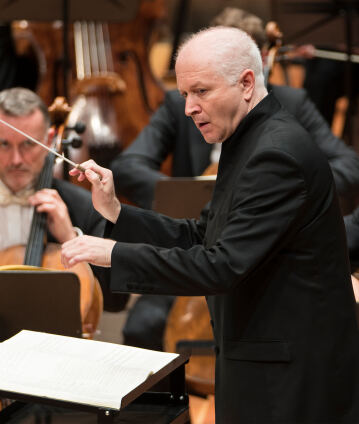Sir George Benjamin conducts the Berliner Philharmoniker

George Benjamin has made a name for himself as the creator of powerful, multi-layered works, and this season is the Berliner Philharmoniker’s Composer in Residence. On this occasion in the role of conductor, he presents music by Boulez, Ravel and Ligeti, which show musical Modernism from its most original side. We also hear Benjamin’s own Palimpsests – a work that is “full of contrasts. In just eight minutes, it packs in as much as some entire symphonies” (The Guardian).
Cédric Tiberghien makes his debut as soloist here – he chose Maurice Ravel’s Piano Concerto for the left hand, a technically immensely demanding work which strikes a balance between dramatic outbursts, sonorous lyricism and captivating jazz effects. Tiberghien says he has been “absolutely obsessed” with playing the piano since his earliest childhood. As a 14-year-old, he began studying at the Conservatoire de Paris where he was awarded the Premier Prix after just three years. His successes in international competitions culminated at the Concours Long-Thibaud-Crespin in Paris in 1998, when Cédric Tiberghien won the first prize – and no less than five special prizes! A spectacular international career followed that has taken the French pianist to the world’s major concert halls.
The concert, conducted by George Benjamin, opens with Pierre Boulez’s composition Cummings ist der Dichter, whose title is based on a misunderstanding: When Boulez was asked by a concert promoter what the piece was called, he wrote in not very good German, “ʻI do not have a title yet, and I can only tell you that Cummings is the poet I have chosen.ʼ The reply from a secretary, who had certainly misunderstood my letter, was: Quant à votre œuvre “Cummings est le Poète”, en allemand: “Cummings ist der Dichter”. I thought that there could not be a better title than the one that came about by chance.” The vocal part is taken by the ensemble ChorWerk Ruhr, one of Germany’s foremost chamber choirs.
The programme continues with György Ligeti’s Clocks and Clouds, a no less complex composition, which uses diatonic melody and harmony coloured by microintervals: “The periodic, polyrhythmic sound-complexes melt into diffuse, liquid states and vice versa. The abstract “text” of the piece is notated in the International Phonetic Alphabet and serves the rhythmic articulation and the transformation of timbre” (Ligeti). The concert closes with George Benjamin’s orchestral work Palimpsests, the first part of which was written for Boulez’s 75th birthday. The title refers to an ancient or medieval manuscript on which the original text has been scraped off and then overwritten – consequently, the various levels of writing remain recognisable and provide mysterious insights into the past. Benjamin’s two-part work also plays “with these the different layers superimposed over each other,” as the composer explained.
© 2018 Berlin Phil Media GmbH
Related interviews
Artists
Our recommendations
- Simone Young conducts Messiaen’s “Turangalîla-Symphony”
- From Bach to Beethoven with Giovanni Antonini
- 2013 New Year’s Eve Concert with Simon Rattle
- Ravel’s Piano Concerto with Hélène Grimaud and Tugan Sokhiev
- “Swing Symphony” with Simon Rattle and Wynton Marsalis
- Daniel Harding conducts Bruckner’s Fifth Symphony